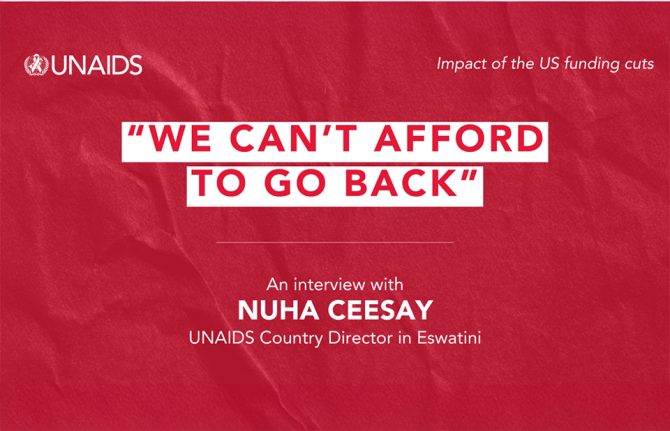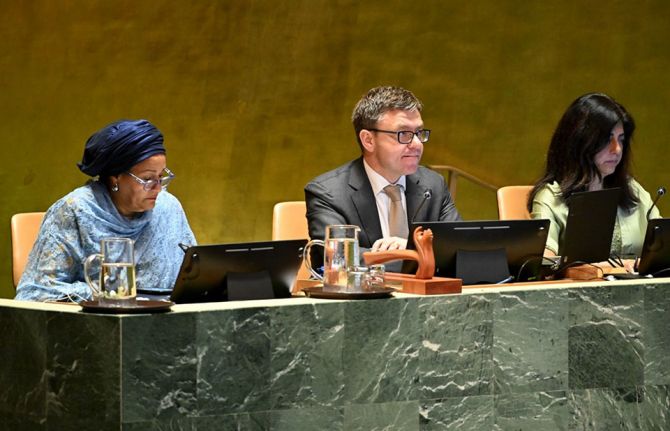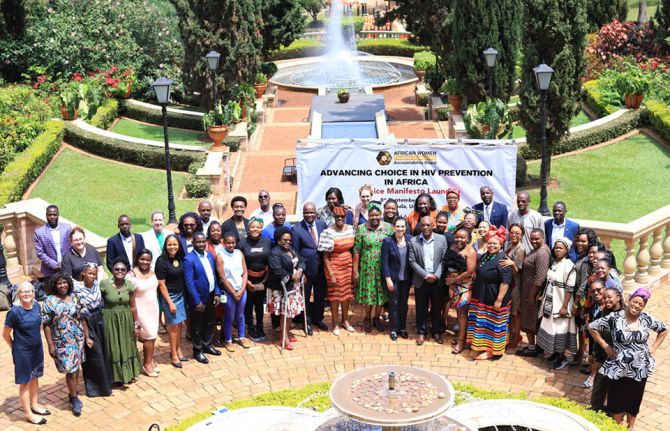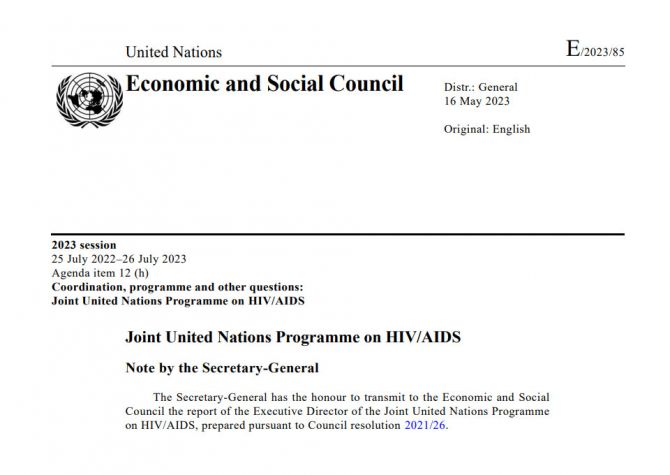
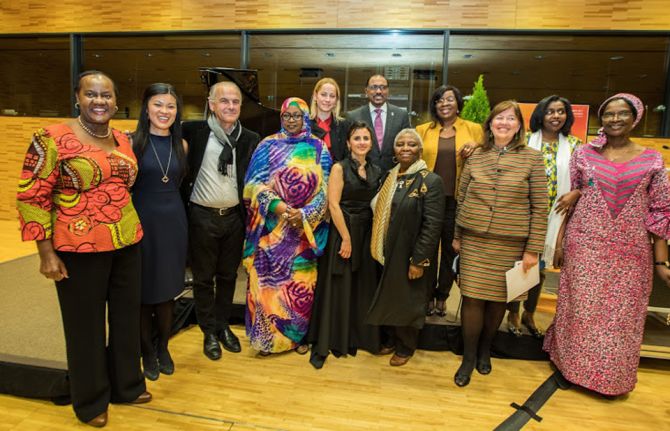


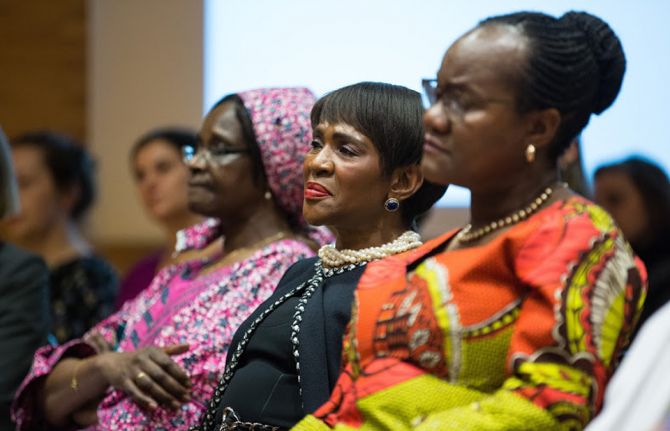
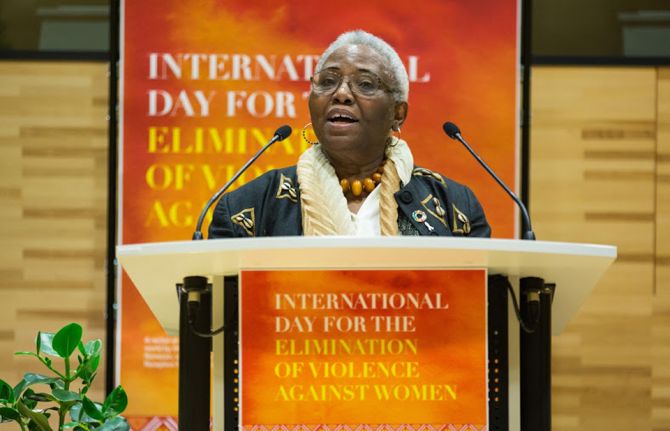
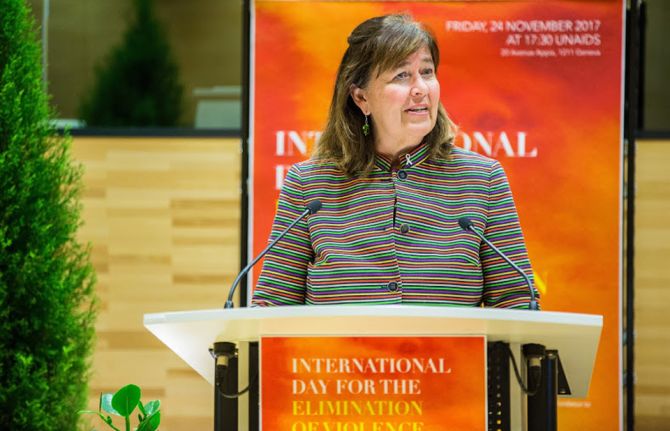
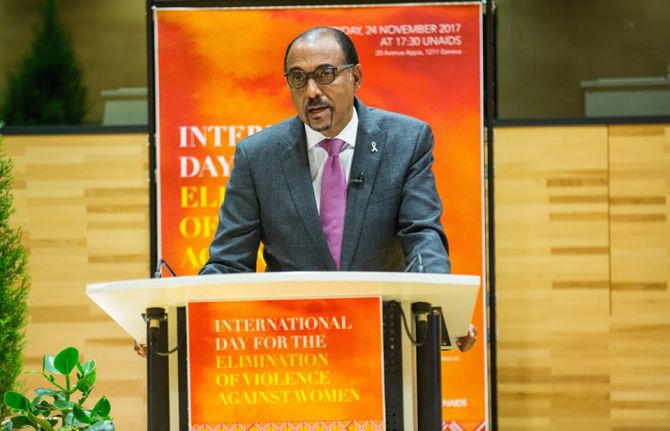
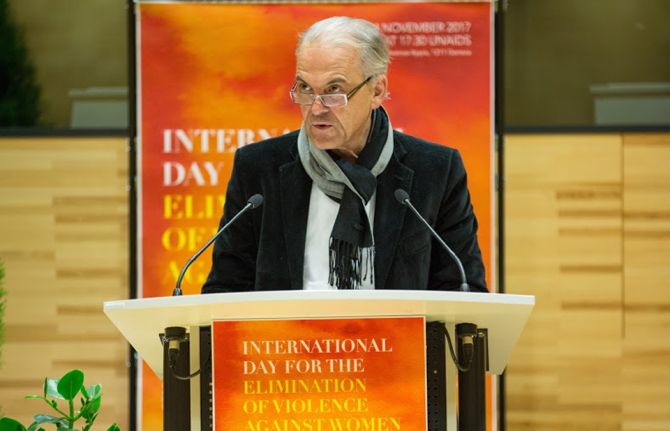
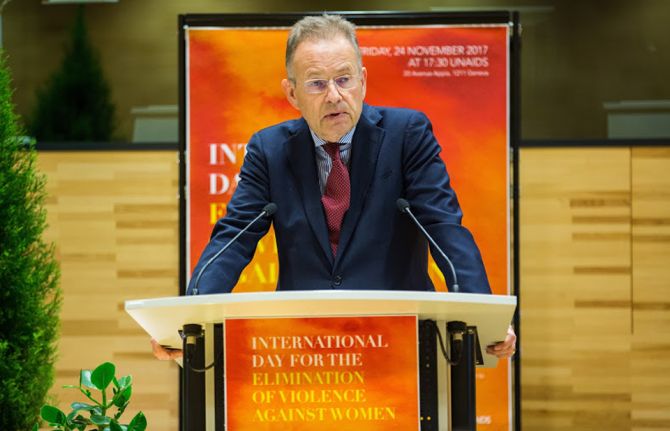
Update
Geneva international community unites to end violence against women and girls
30 November 2017
30 November 2017 30 November 2017To galvanize joint action to end the epidemic of violence against women and girls, the African Women Ambassadors to the United Nations in Geneva and UNAIDS convened a special event on the eve of the International Day for the Elimination of Violence against Women and to kick off 16 Days of Activism.
The event, held on 24 November in UNAIDS’ headquarters in Geneva, Switzerland, was attended by more than 35 ambassadors to the United Nations in Geneva.
Interspersed with music originating from all corners of the world performed by pianist Layla Ramezan, the speakers spoke from diverse perspectives, both international and local.
The speakers emphasized that more than one in three (35%) women worldwide have experienced either physical and/or sexual violence in their lifetime and that, in some regions, women who are subjected to intimate partner violence are on average 1.5 times more likely to acquire HIV. Yet, according to the World Bank, 18 of 107 countries examined had no domestic violence legislation, and 45 had no legislation that specifically addresses sexual harassment. Every day, approximately 47 700 girls are married before their 18th birthday. In developing countries, one in every four girls is married before reaching age 18. One in nine is married under age 15, while an adolescent girl dies from violence every 10 minutes somewhere in the world.
Many also spoke about the importance of people, not numbers. They noted that the painful stories of women and girls facing violence must be shared, and breaking the cycle of violence is critical for achieving gender equality. The role of new technologies in perpetuating ancient injustices was emphasized and a powerful call was made for everyone to take action, whether calling out violence or harassment or speaking about it with family and friends.
The event concluded with a silent auction to raise funds for the African Women Ambassadors Fellowship Programme to support and empower young African women in international development and policy-making.
Quotes
“We know the facts and we should all be outraged. But it is not about numbers, it is about people. Every woman and every girl has a right to live with dignity, respect and free from violence.”
“Eliminating gender inequality is key to addressing violence against women and girls. It is fundamentally a human rights issue.”
“We need to change attitudes and practices to achieve a world where women can live a life free of violence. Let’s orange the world!”

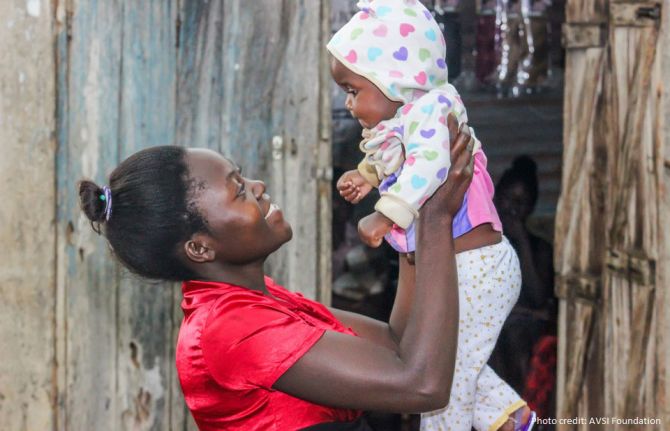
Update
PEPFAR announces continued progress against HIV
06 December 2017
06 December 2017 06 December 2017New results from the United States President’s Emergency Plan for AIDS Relief (PEPFAR) announced on World AIDS Day 2017 show strong advances in scaling up HIV prevention and treatment.
UNAIDS recently reported that nearly 21 million people living with HIV are accessing antiretroviral therapy—more than half of the 36.7 million people living with HIV are now on life-saving treatment. PEPFAR’s latest data show that PEPFAR supported more than 13.3 million of those men, women and children.
PEPFAR’s new data also indicate that there have been significant declines in new HIV infections among adolescent girls and young women. In the 63 districts of 10 African countries implementing PEPFAR’s pioneering DREAMS (Determined, Resilient, Empowered, AIDS-free, Mentored and Safe) public–private partnership, the majority (65%) of the highest HIV burden communities or districts achieved a greater than 25% decline in new HIV infections among adolescent girls and young women. Importantly, new HIV infections declined in nearly all DREAMS programme districts.
By the end of September 2017, PEPFAR had provided voluntary medical male circumcision to more than 15.2 million men and boys. This result was reached through the largest single-year increase (3.4 million) in new voluntary medical male circumcisions since the beginning of PEPFAR.
PEPFAR has supported more than 6.4 million orphans and other vulnerable children and their caregivers affected by HIV and has prevented HIV infection among 2.2 million babies born to women living with HIV.
The new data add to PEPFAR’s impact results released in the past year, which show that five African countries are approaching control of their HIV epidemics. They also highlight critical advances being made under the PEPFAR Strategy for Accelerating HIV/AIDS Epidemic Control (2017–2020), which was launched by United States Secretary of State Rex Tillerson at the 2017 United Nations General Assembly.
Quotes
“We are at an unprecedented moment in the global AIDS response. Our latest results clearly show the remarkable impact of the United States President’s Emergency Plan for AIDS Relief’s accelerated HIV prevention and treatment efforts.”
Partner

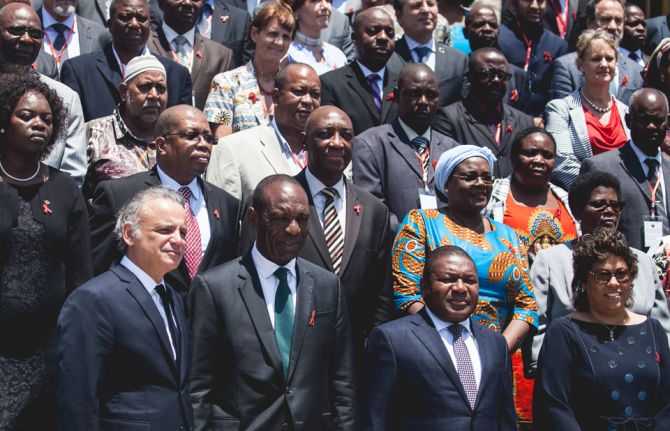
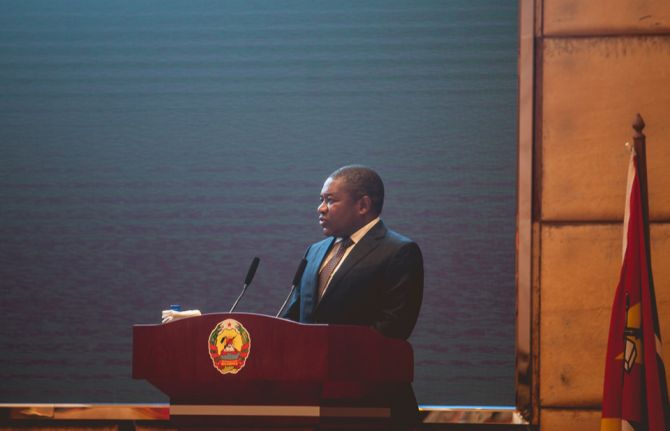
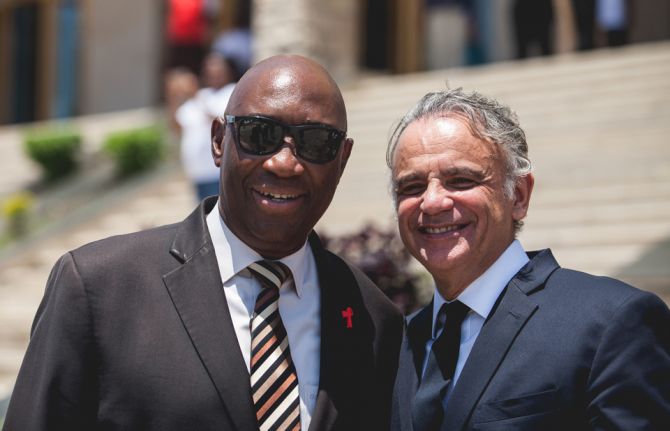
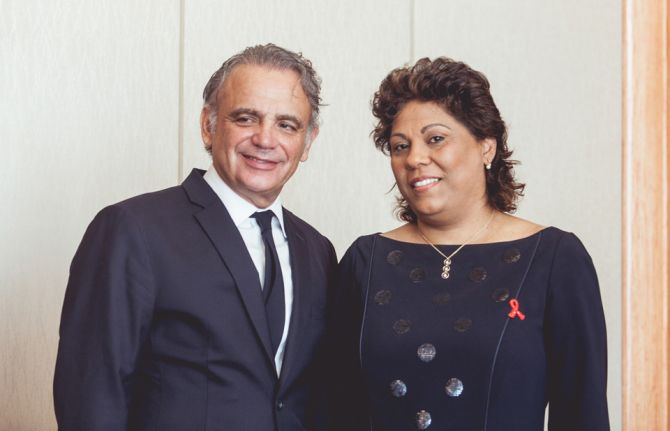
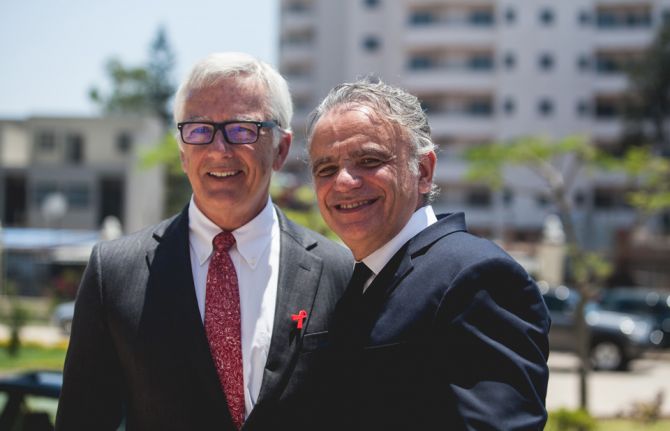
Update
Mozambique reinforces its commitment towards ending AIDS
02 December 2017
02 December 2017 02 December 2017The President of Mozambique, Filipe Jacinto Nyusi, chaired an extraordinary board meeting of the National AIDS Council on World AIDS Day in Maputo, Mozambique. The meeting brought together government representatives and community and religious leaders from all provinces of the country and national and international stakeholders to reinforce the country’s commitment towards ending AIDS as a public health threat by 2030.
In his opening speech, Mr Nyusi underlined that everyone, including community members, government representatives and religious leaders, has a role to play in the response to HIV and called on everyone to join forces to overcome the cultural barriers that are preventing people living with HIV and key populations accessing the services they need. He also stressed the importance of protecting adolescent girls and young women and emphasized that an innovative communication strategy will be required to bring about social change.
UNAIDS Deputy Executive Director Luiz Loures commended the country’s leadership for the progress made in the past 10 years, with almost 1 million people accessing antiretroviral therapy. He also stressed the importance of providing space and resources to communities, as they are key to advancing the response to HIV and to reaching populations that otherwise would be left behind. He also assured Mr Nyusi that UNAIDS will strongly support Mozambique’s efforts to end the AIDS epidemic.
Carlos Agostinho do Rosário, Prime Minister of Mozambique and Chair of the National AIDS Council board, chaired the open plenary discussion with community leaders. Nazira Abdula, Minister of Health of Mozambique, other cabinet ministers, Iolanda Cintura, Governor of Maputo City, and David Simango, Mayor of Maputo City, were among other high-level officials of the country present at the meeting.
The participants at the meeting agreed that scaling up HIV prevention programmes, putting communities at the centre of the response, addressing stigma and discrimination and focusing on achieving the 90–90–90 targets are urgently needed to step up the pace of the response to AIDS in the country.
Quotes
“It’s time for action. We need to Fast-Track the HIV response in a coordinated way, in partnership with all key stakeholders.”
“Community leadership, including civil society and traditional and religious leaders, play a central role in fostering community dialogue in responding effectively to HIV.”
“Strengthening HIV integration with broader health problems to maximize investments in the AIDS response remains a priority for Mozambique.”
“Thank you to the President of Mozambique and to his entire government for demonstrating the urgency required for the response to HIV today.”
“We must use our influence and our voice as political, public health, community, religious, and family leaders to demand that all people are afforded basic human rights and treated with respect and dignity.”
“We need to reinforce HIV prevention, intensifying new actions in a coordinated way, involving all key stakeholders and partners.”
Region/country
Related

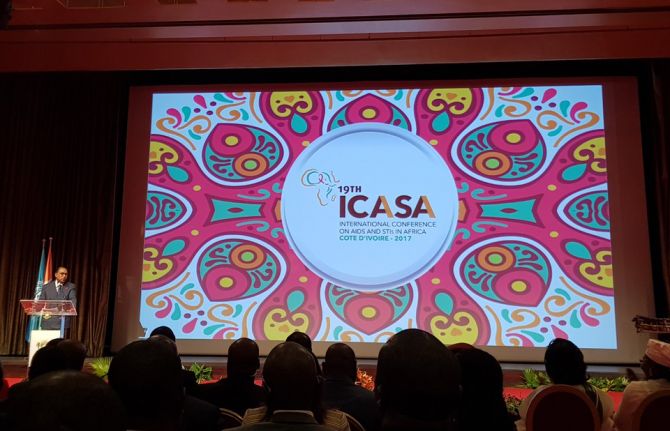
Update
ICASA opens in Abidjan
04 December 2017
04 December 2017 04 December 2017Just days after World AIDS Day, the 19th International Conference on AIDS and STIs in Africa (ICASA) has opened in Abidjan, Côte d’Ivoire.
At the opening ceremony, UNAIDS Executive Director Michel Sidibé implored the audience not to let ongoing political and social troubles threaten the many achievements made in the AIDS response. In his speech, he laid out key priorities, including ensuring that women and adolescents be better protected from HIV, and demanded more space for civil society, crediting civil society’s huge impact in the AIDS response.
ICASA, a biennial gathering that this year will be held from 4 to 9 December, brings together people working in the field of HIV, as well as leaders, people living with HIV, activists and representatives of civil society. In addition, researchers from around the world will share the latest scientific advances to develop strategies to further HIV prevention and treatment options. More than 4000 delegates from more than 125 countries have gathered for the event.
UNAIDS is hosting several sessions during the conference to discuss the western and central Africa HIV catch-up plan. Other events organized by UNAIDS at ICASA include sessions on reinvigorating HIV prevention following the Prevention Coalition initiative, innovative partnerships to drive male engagement, ending the AIDS epidemic among children and young women under the Start Free, Stay Free, AIDS Free framework and achieving the Fast-Track Targets in cities.
Abidjan is playing host to ICASA for the second time. In the ICASA held in 1997, the then French President, Jacques Chirac, denounced the injustices experienced by people living with HIV in Africa.
Quotes
“Abidjan is thrilled to play host for the second time to this important AIDS conference gathering leaders, scientists and those working in the HIV field. Let us not forget the important role that research can play. We must increase our overall investments notably in research to improve the quality of life of people living with HIV.”
“The many changes under way in our world should not threaten the sustainability of our great achievements in the AIDS response. We cannot afford to lose our gains. If we want to end this epidemic, we must act now and act differently.”
“Health is a right, ending AIDS is our duty.”
“I am 20 and was born with HIV. I am here in front of you, young and in good health taking medicine, so do not give up. And to those of you who are free of HIV, do everything you can to protect yourselves.”

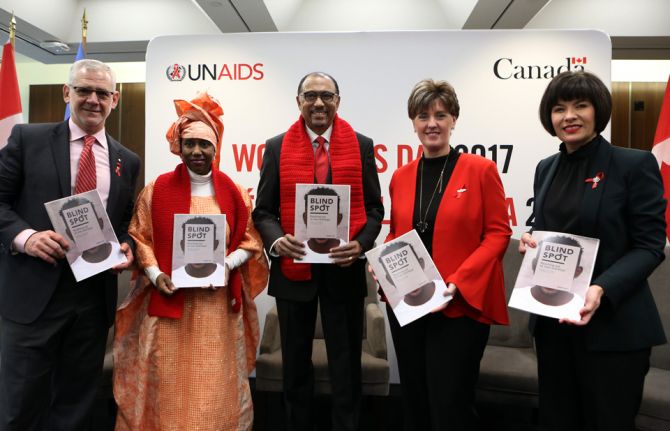
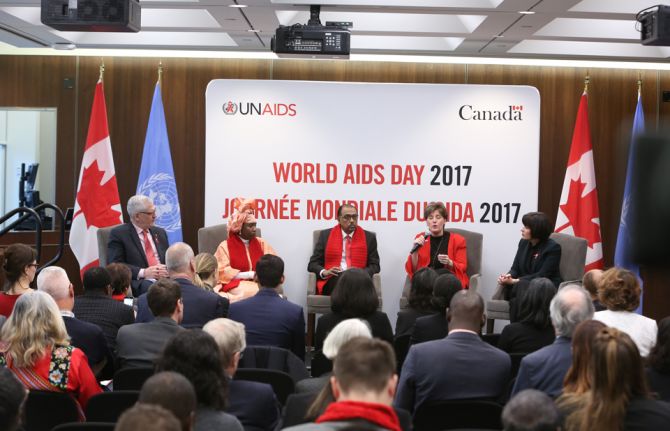
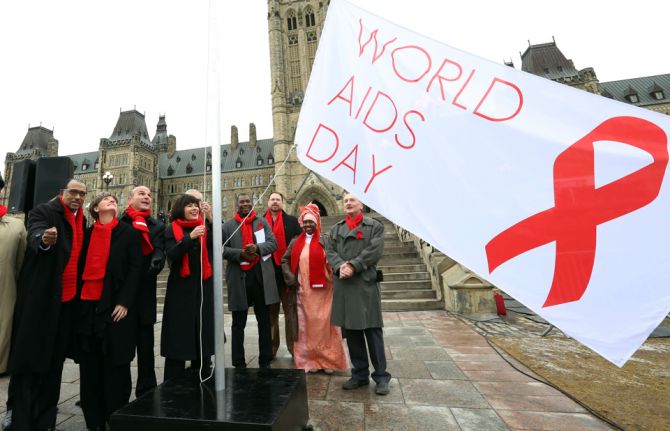
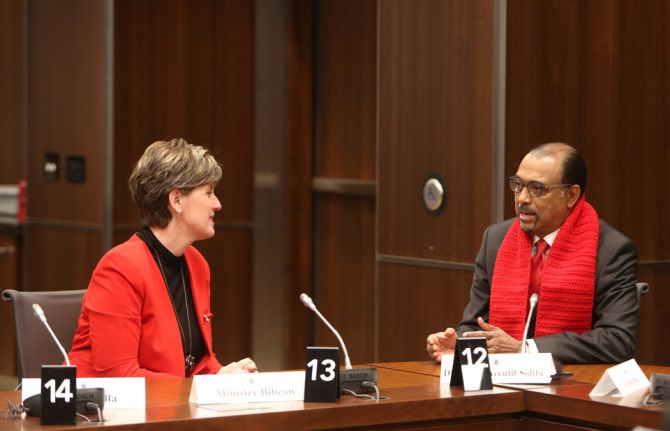
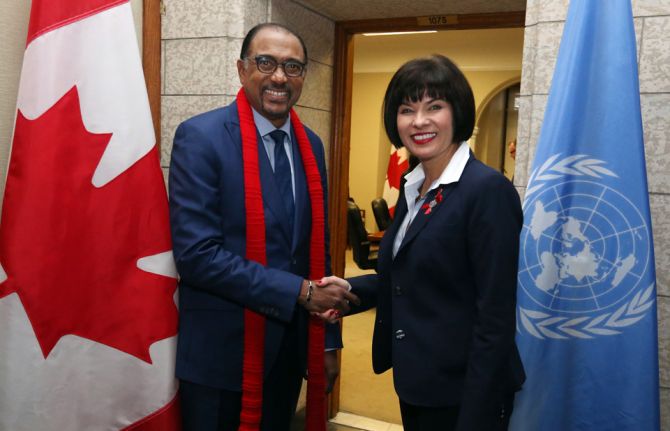

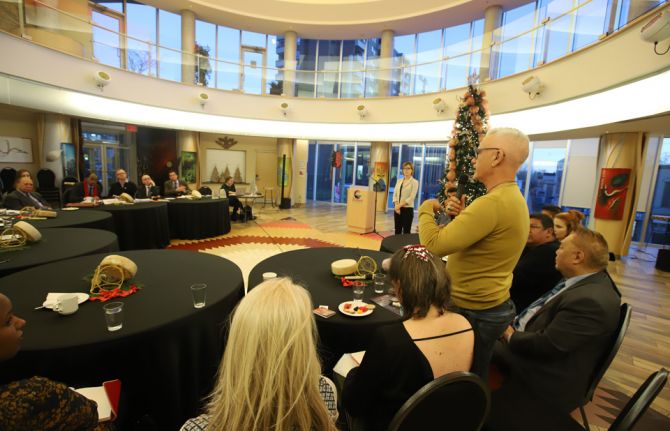
Update
Learning about the AIDS response in Canada
01 December 2017
01 December 2017 01 December 2017During a visit to Ottawa, Canada, from 29 November to 1 December, UNAIDS Executive Director Michel Sidibé discussed with government officials ways to strengthen collaboration with the Canadian Government and met with representatives of civil society.
Mr Sidibé visited the AIDS Committee of Ottawa to see first-hand how a frontline AIDS service organization is responding to the opioid crisis in Canada. At a round-table discussion with Canadian civil society organizations, the successes and challenges in the Canadian response to HIV were highlighted. During the discussion, Mr Sidibé stressed that a vibrant civil society was critical to scaling up responses towards universal access to HIV prevention, treatment, care and support.
Mr Sidibé also met Marie-Claude Bibeau, Minister of International Development and La Francophonie, and Diane Jacovella, Deputy Minister of International Development, who underlined the progress made in preventing new HIV infections and the important impact those efforts are having on women’s health, including the sexual and reproductive health and rights of women.
Mr Sidibé spoke with senior government officials during a town hall meeting on human rights-based approaches to health and how the response to HIV can be a catalyst for accelerating progress towards achieving the Sustainable Development Goals. He shared his vision and perspective on the opportunities towards ending AIDS and spoke about the recent reform of UNAIDS. The link between sexual and reproductive health and HIV was discussed, as was the need for greater efficiencies and reform in the global health architecture.
Mr Sidibé also met the Minister of Health, Ginette Petitpas Taylor, and the Minister of Indigenous Services, Jane Philpott, to discuss the HIV epidemic in Canada and to hear their perspectives on the current needs and challenges of the AIDS response in the country, especially among indigenous populations. It was highlighted that tuberculosis and hepatitis are major causes of death among indigenous people in Canada. They discussed how cooperation between UNAIDS and Canada could help in addressing the special needs of indigenous people.
The visit ended on World AIDS Day with the launch of a groundbreaking report on increasing male engagement in health services and with Mr Sidibé raising a flag on Parliament Hill with Ms Bibeau, Ms Petitpas Taylor and representatives of people living with HIV.
Quotes
“We need Canadian leadership to achieve social justice and the end of the AIDS epidemic by 2030.”
“We must address the gender inequality that allows HIV to flourish—for women and girls, and for men and boys too. This year’s UNAIDS report tells us that men are less likely to take an HIV test or seek medical help when they are sick, and if they do access treatment, they are less likely to stick with it. We must do a better job of reaching our men and our youth with HIV services, both for them and for their partners and families.”
“Canada is committed to the UNAIDS 90–90–90 treatment targets and the goal of eliminating AIDS by 2030. We have important research and community-based projects across Canada that reflect our government’s focus on supporting prevention, reducing stigma and discrimination, and increasing access to testing and treatment for people living with HIV and other sexually transmitted and blood-borne infections.”
Region/country
Related
 Government ensures continuity of treatment in Malawi
Government ensures continuity of treatment in Malawi

10 February 2025

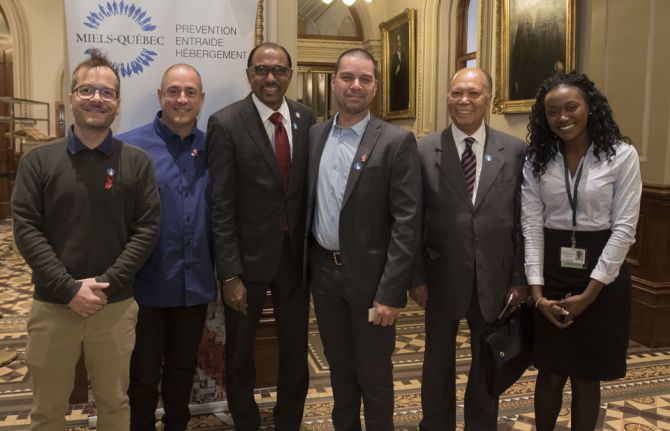
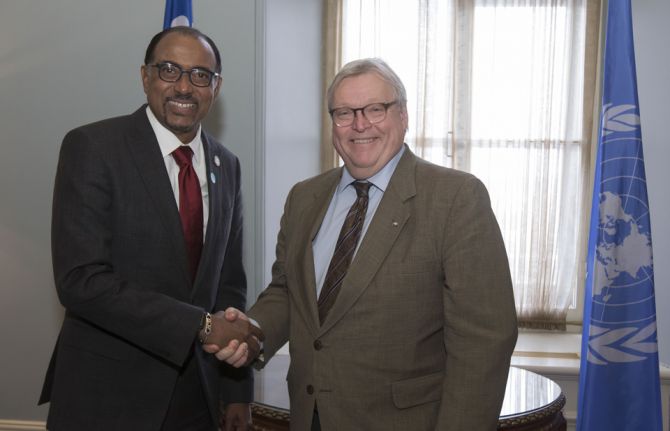
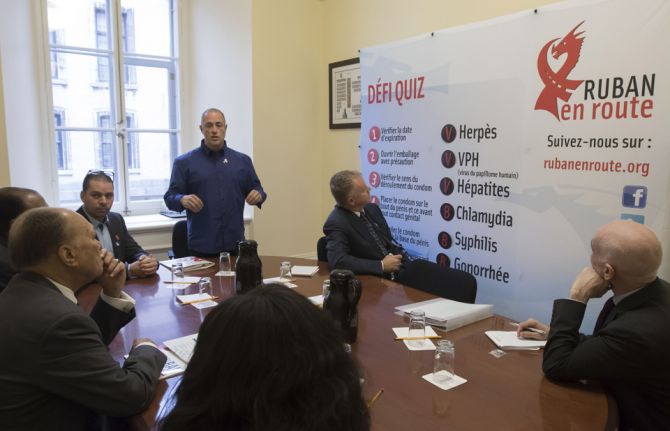
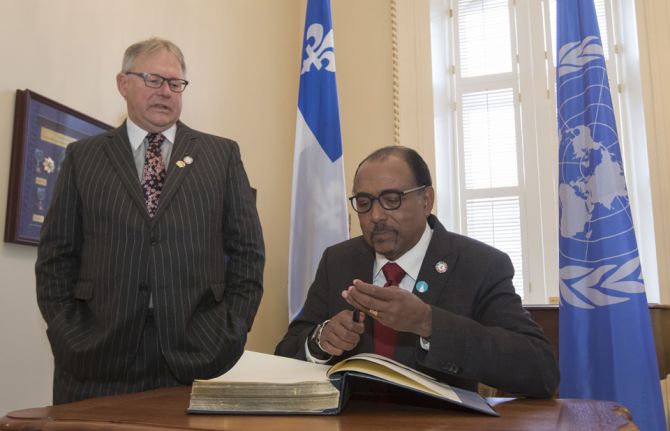
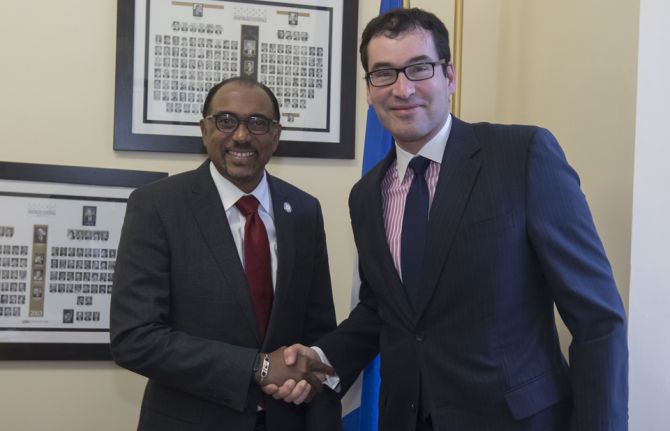
Update
Quebec parliamentarians and civil society both vital to the AIDS response
29 November 2017
29 November 2017 29 November 2017During a visit to Canada, on 28 November UNAIDS Executive Director Michel Sidibé met with members of the Government of Quebec, members of parliament and civil society at the National Assembly of Quebec.
In meetings with the Quebec Minister of Health, Gaétan Barrette, and the Deputy Minister for International Relations and the Francophonie, Jean-Stéphane Bernard, Mr Sidibé underlined that it is important that UNAIDS’ work be aligned with that of the Quebec Government and stressed the need to tailor the response to HIV in accordance with the needs of the country or region. He also spoke about the urgent need to make HIV prevention more effective and the importance of investing in HIV prevention and reducing the number of new HIV infections.
Mr Sidibé also discussed Quebec’s AIDS response and visited Point de Repères, a community-based organization that advocates for harm reduction. He met with leaders from MIELS-Québec, a community-based organization working for more than 30 years with people living with HIV, and Ruban en Route, a not-for-profit organization providing prevention education programmes designed to reduce sexual risk behaviours.
During meetings with members of Quebec’s Parliament, including with Jacques Chagnon, President of the National Assembly and President of the Parliamentary Assembly of La Francophonie, Mr Sidibé emphasized the important role that parliamentarians play in the global response to HIV. He also stressed that parliamentarians are critical to advancing the vision of ending AIDS by 2030 through their leadership, advocacy role and ability to authorize and oversee spending on AIDS.
Quotes
“The National Assembly of Quebec is a vital ally for social justice and to guarantee the right to health for all. Together we can end the AIDS epidemic by 2030.”
“The National Assembly of Quebec is pleased to contribute, to the best of its ability, to the exchange of information and experiences on best practices in the response to HIV through the Parliamentary Network for the Fight Against HIV/AIDS, which was created by the Parliamentary Assembly of La Francophonie.”
“In the framework of the 90–90–90 targets, Quebec has mobilized and made a lot of effort. Although the last percentages are the most difficult to reach, we are on the right track. We can count on invaluable partners in this regard, particularly from community organizations, as demonstrated by our recent collaboration in the implementation of supervised injection sites in Montreal.”
Region/country

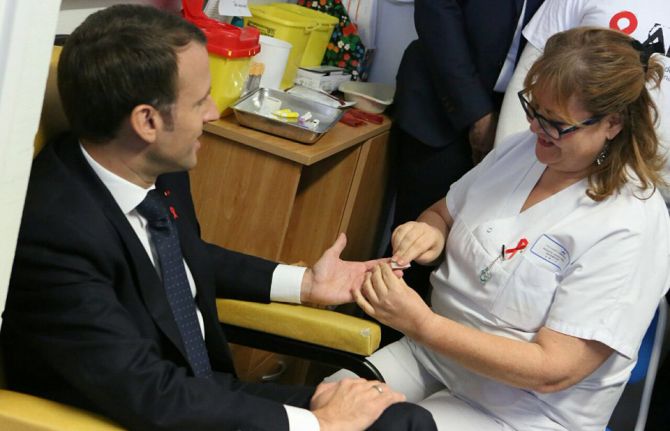
Update
UNAIDS congratulates the President of France for his leadership on AIDS
01 December 2017
01 December 2017 01 December 2017On World AIDS Day, the President of France, Emmanuel Macron, led by example by taking a HIV test.
Mr Macron and the First Lady of France, Brigitte Macron, visited a hospital in Saint Denis in northern Paris that caters to people in vulnerable situations, including migrants. Speaking after taking the HIV test, Mr Macron said, “We have not won the battle against AIDS. We need to protect ourselves, get tested, get treated and accept those in society who have HIV.”
Globally today, 40% of people living with HIV don’t know their HIV status. In France, one in five people living with HIV do not know their HIV status. The majority of new HIV infections in the country occur among gay men and other men who have sex with men.
“Emmanuel Macron is showing leadership in action. By publicly taking an HIV test, he has demonstrated French leadership on the right to health,” said Michel Sidibé, UNAIDS Executive Director. “France is a valued partner of UNAIDS.”
Earlier, on 28 November, Mr Macron renewed his commitment to the global AIDS response during a speech to young students at the University in Ouagadougou, Burkina Faso.
France has played a critical role in ensuring access to medicines globally through its contribution to the Global Fund to Fight AIDS, Tuberculosis and Malaria, to which it has donated more than US$ 4.8 billion. France also supported the creation of UNITAID in 2006.
These investments have yielded substantial results. Through global solidarity today nearly 21 million people have access to HIV treatment. In 2016, 53% of people living with HIV were on treatment.
Prévenir, dépister, continuer à soigner. #WorldAIDSDay pic.twitter.com/y2VTZitiOY
— Emmanuel Macron (@EmmanuelMacron) December 1, 2017
Region/country
Related
 Government ensures continuity of treatment in Malawi
Government ensures continuity of treatment in Malawi

10 February 2025

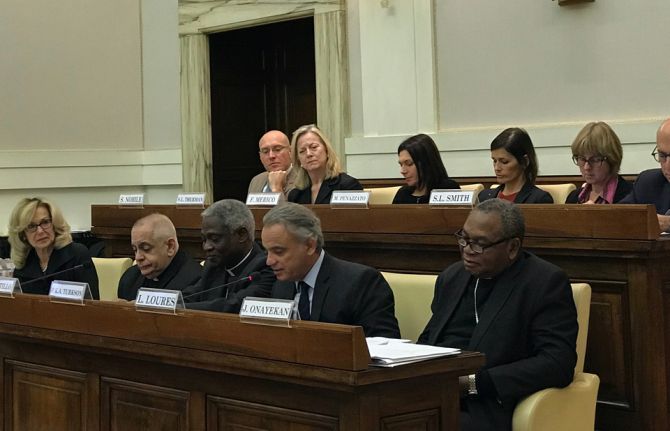
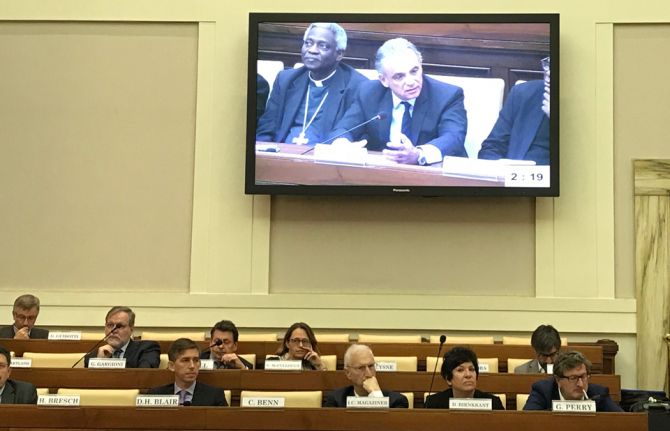
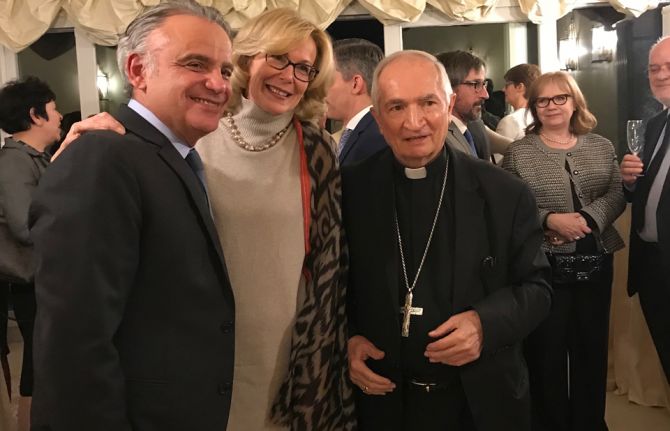
Update
High-level discussion to scale up HIV diagnosis and treatment for children and adolescents
17 November 2017
17 November 2017 17 November 2017On 17 November, leaders from national and international organizations met in Vatican City to address concerns about securing early testing and treatment for children and adolescents living with HIV.
The meeting brought together leaders of major pharmaceutical and medical technology companies, multilateral organizations, donors, governments and organizations providing or supporting services for children living with HIV for a high-level dialogue.
The consultation saw a discussion on how to reduce illness and deaths among children living with HIV, particularly by accelerating the development and introduction of priority paediatric formulations of antiretroviral medicines. In contrast to the development of better antiretroviral medicines for adults living with HIV over the past 20 years, there have been very few new optimal medicines made available for children. Existing paediatric antiretroviral medicines are often bitter tasting, difficult to administer and inappropriate for low-resource settings.
In 2016, among the 2.1 million children aged 0–14 years living with HIV, 43% were accessing antiretroviral therapy, compared to 54% of adults living with HIV. The lack of suitable antiretroviral medicines for children has contributed in part to low levels of treatment initiation, retention in care and viral load suppression.
The participants made proposals to speed up the research, development, approval, introduction and uptake of medicines and formulations for infants, children and adolescents. These included steps to make priority medicines in the pipeline quickly available in the short term and innovative mechanisms to facilitate and accelerate the development of paediatric formulations for HIV and other life-threatening diseases over the longer term.
The meeting was convened by Peter Kodwo Appiah Turkson, Cardinal and Prefect of the Dicastery for Promoting Integral Human Development, with the United States President’s Emergency Plan for AIDS Relief, UNAIDS and Caritas Internationalis, in close collaboration with the World Council of Churches–Ecumenical Advocacy Alliance (WCC–EAA), the World Health Organization and the Elizabeth Glaser Pediatric AIDS Foundation.
Quotes
“I have no doubt that good will and the prophetic moral leadership of Pope Francis and other religious leaders will strengthen our resolve to make real and accountable progress in our efforts to eliminate paediatric HIV by making available early diagnosis and treatment to all children and adolescents who are living with HIV.”
"Our shared values to reach children in need of HIV testing before they get sick is our shared mission. Together, we have committed to concrete steps outlined in this Action Plan that children will have access to safe and effective treatment."
“The future of the global AIDS epidemic depends on what happens in Nigeria and today we have Cardinal Onaiyekan here—our bridge to the country realities in Nigeria. The trajectory changed when we were able to bring down the price of medicines in South Africa; Nigeria is the next big challenge.”
“Last week in Malawi I met with a teen club. When I came in, I thought these children were six, seven and eight years old and then they gave their ages: 11, 12, 13 and 14, malnourished and so small. They get one meal per day. I take one pill a day, they take many different pills per day—it is unbearable that children live in worse conditions than adults. How have we let this happen? And what can we do in this meeting to change that?”
Related

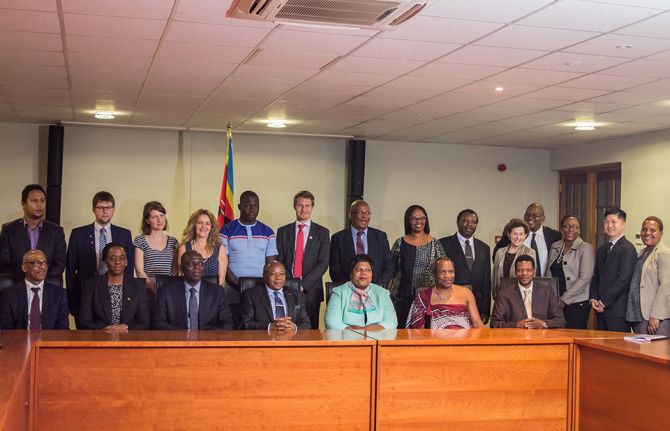
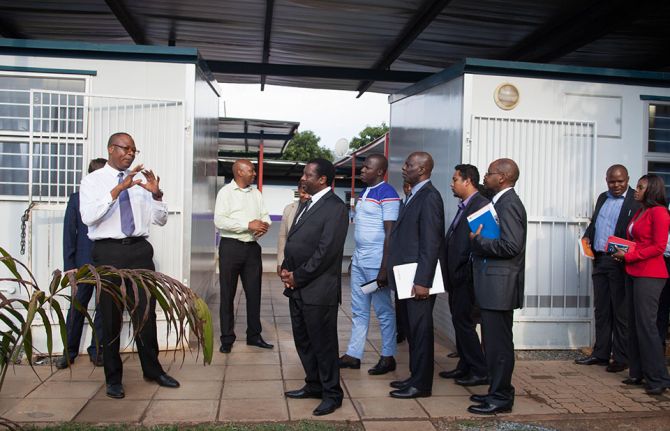
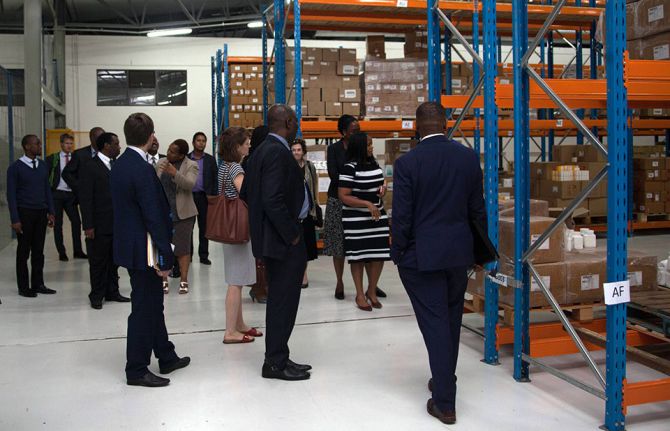
Update
UNAIDS PCB learns about the response to HIV in Swaziland
28 November 2017
28 November 2017 28 November 2017A delegation of the UNAIDS Programme Coordinating Board (PCB) visited Swaziland from 14 to 16 November to get insight into the country’s national AIDS response. During the visit, the delegation met the Acting Prime Minister, the Minister of Health and other representatives of the government, civil society, the private sector and development partners. The meetings with the political leadership clearly displayed the commitment to the response from the highest political level, from the King down.
During the meetings, the close collaboration between the United States President’s Emergency Plan for AIDS Relief and UNAIDS, based on UNAIDS’ role as the key link between the Prime Minister’s Office, the Ministry of Health and the broader political leadership, and with key civil society stakeholders, was noted. The critical role of the Joint Programme in preparing the recent concept note submitted for an application for financing by the Global Fund to Fight AIDS, Tuberculosis and Malaria for the AIDS response in Swaziland was also discussed.
The delegation engaged with representatives of civil society organizations and youth groups, and discussed disclosure of HIV status with them, hearing about the difficulties in disclosure, particularly for young people. The increasing, but still quite low levels of, reporting of sexual and gender-based violence and the importance of providing the types of flavoured condoms that appeal to young people were also discussed, as was the difficulty in funding the critical prevention work of civil society organizations.
The delegation complimented officials and representatives for their contribution to the sizeable scale-up of access to treatment and the significant number of people living with HIV who are virally suppressed. However, with 171 000 people living with HIV on life-saving treatment in 2016 and pilots being undertaken with pre-exposure prophylaxis, it was noted that the cost of treatment and prevention services is high and will remain so for many years.
The visit also explored the role of the private sector in the country, which has been significant. In a visit to the Royal Swaziland Sugar Corporation in Simunye, the delegation learned about how, in a spirit of corporate social responsibility, the company’s clinics provide health services to all staff, including seasonal staff, and their families, as well as surrounding communities. HIV counselling, testing and treatment are among the services provided.
The delegation heard about the possibility of further expanding the company’s engagement and its role in the surrounding community, including its prevention work, which particularly focuses on young women and adolescent girls, who are at higher risk of HIV infection.
During the country visit, the delegation also met with prison staff, development partners, media representatives and the United Nations country team. Throughout the visit, the delegation was supported by Zwelethu Mnisi, the Permanent Representative of Swaziland to the United Nations.
Quotes
“Changing cultural behaviour is very complex, so we decided to use the aspects of the Swazi culture and the roles of chiefs that could be beneficial. We have had chiefs as champions, who have come forward as living with HIV and encouraged people to test, and to access HIV prevention and treatment.”
“Swaziland’s political leadership, from the highest level, decided to tackle HIV and embark on an impressive roll-out of HIV treatment. The response has been accelerated in recent years to pursue and come close to the 90–90–90 targets.”
“We need to collectively work on the financial sustainability of the AIDS response in Swaziland. The level of international solidarity and funding has been critical to keeping people living with HIV alive and reducing HIV incidence dramatically, but we need a balanced transition plan for the sustainability of the response, including the contribution of the private sector.”
Region/country


Update
Deutsche AIDS-Stiftung makes awards for outstanding contributions to the global AIDS response
15 November 2017
15 November 2017 15 November 2017Princess Mabel van Oranje-Nassau and UNAIDS Executive Director Michel Sidibé were presented with the World Without AIDS Award in Berlin, Germany, on 4 November in recognition of their achievements in the global AIDS response.
The awards were made by Deutsche AIDS-Stiftung, the German AIDS foundation, during its annual Benefit Opera Gala, which brought together 2000 guests to raise money for the AIDS response and to speak out against stigma and discrimination.
Princess Mabel van Oranje-Nassau was honoured for her almost 20-year commitment to ending AIDS. She is the Chair and founder of Girls not Brides, the global partnership to end child marriage, which consists of more than 800 civil society organizations in 95 countries.
Mr Sidibé received his award in recognition of his work to achieve the goal of ending AIDS by 2030.
During the gala, which has been raising awareness and funds for people living with HIV since 1994, Mr Sidibé highlighted the growing HIV epidemic in eastern Europe and central Asia, which saw a 60% increase in new HIV infections between 2010 and 2016. He made it clear that the shrinking space for civil society in the region will exacerbate stigma and discrimination and will drive people away from life-saving services.
Germany is a leader in global health and has consistently driven progress in the AIDS response at both the national and international levels. In 2017, the German nongovernmental umbrella organization Deutsche AIDS-Hilfe launched a campaign to end AIDS in Germany by 2020.
Quotes
“If we can keep girls in school and out of marriage and protect them from HIV infection, they will be better educated, healthier and more prosperous. And that’s not good just for those girls, that’s also good for their families, their communities and their countries. So let girls be girls and not brides.”
“We need to make the impossible possible for the most marginalized people.”
“The number of guests here today and their strong engagement proves how relevant our fight against HIV still is.”














